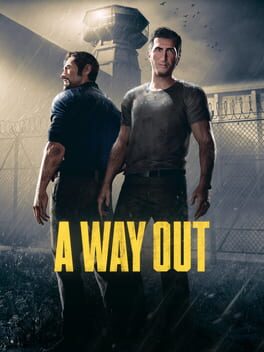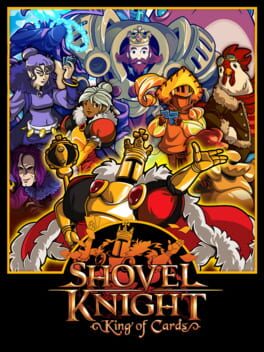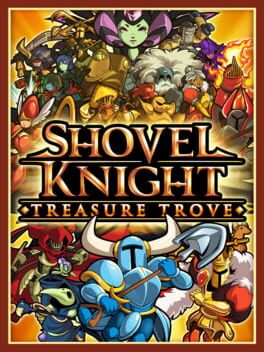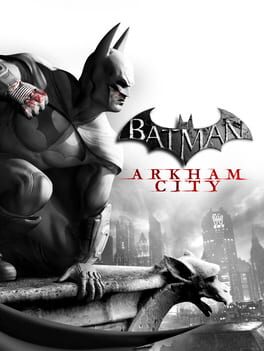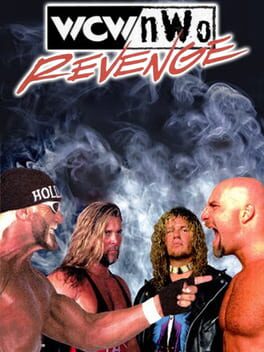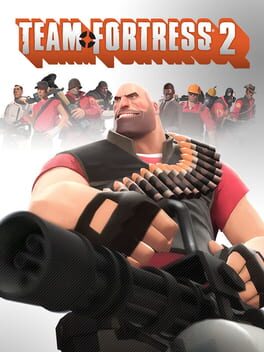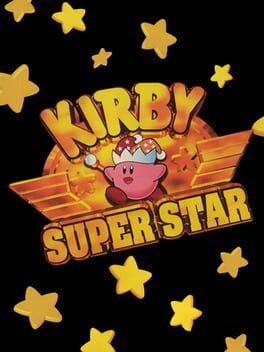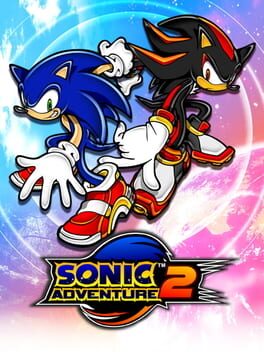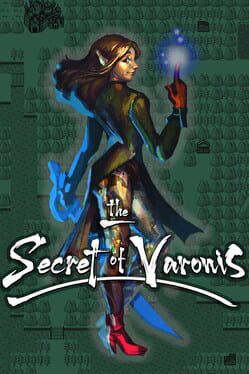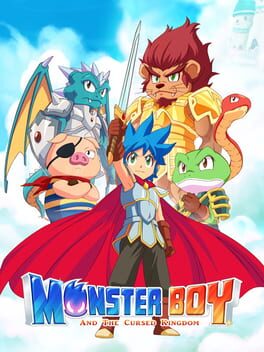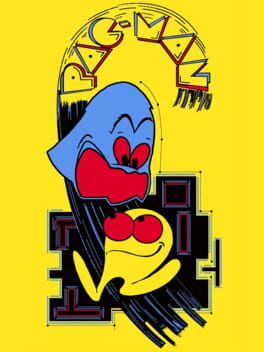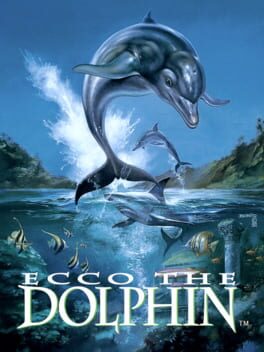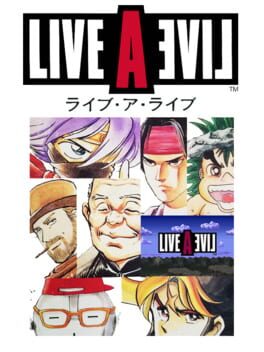Hammontron
318 Reviews liked by Hammontron
A Way Out
2018
I knew this was a good game when I drew a mustache on that one family’s portrait in the farmhouse, and in response, my friend erased it. This action created a tug of war, which resulted in me adding and him erasing the mustache repeatedly throughout the course of the level.
That was until finally, I trapped him in the middle of a co-op platforming puzzle and made him watch as I slowly walked back to the portrait to draw the mustache on before returning to finish the co-op puzzle, causing the level to end and emerging from the mustache war victorious as he wallowed in a pool of agonizing defeat.
I also got to beat his ass at connect four and fucking kill him at the end of the game.
That was until finally, I trapped him in the middle of a co-op platforming puzzle and made him watch as I slowly walked back to the portrait to draw the mustache on before returning to finish the co-op puzzle, causing the level to end and emerging from the mustache war victorious as he wallowed in a pool of agonizing defeat.
I also got to beat his ass at connect four and fucking kill him at the end of the game.
A perfect way to cap off Shovel Knight Treasure Trove. I'm amazed at how Yacht Club Games managed to reimagine these levels so well across four separate campaigns, with four unique control schemes. King Knight, like Plague Knight, takes a while to get used to, but handles like a DREAM once you get it down.
The way they expanded on his character is particularly impressive. He's such a nothingburger in the original campaign, serving only as the first simple boss to beat. Through his own adventure, he becomes surprisingly compelling, perhaps being the most fleshed-out character in Treasure Trove. That final cutscene was impressively powerful after the journey he went through, the decisions he made, and the knowledge we have of what happens next.
[EDIT: Returning to this review after a month of mulling it over to say that this is 100% my favorite ending to any video game. I can't stop thinking about it.]
Lastly, Joustus. I hated Joustus at first, but the more I stuck with it, the more I loved it, and by the end of the game, I was legitimately sad there were no more Joustus matches. What I thought would be a lame diversion of a card game turned out to be one of my favorite aspects of Treasure Trove.
Yacht Club delivered everything they promised in their Kickstarter. That alone is impressive. But even more impressive is that the quality never dipped. Every bit of Shovel Knight: Treasure Trove is treasure indeed, and King of Cards was a worthy ending to the greatest retro pixel art game ever created.
The way they expanded on his character is particularly impressive. He's such a nothingburger in the original campaign, serving only as the first simple boss to beat. Through his own adventure, he becomes surprisingly compelling, perhaps being the most fleshed-out character in Treasure Trove. That final cutscene was impressively powerful after the journey he went through, the decisions he made, and the knowledge we have of what happens next.
[EDIT: Returning to this review after a month of mulling it over to say that this is 100% my favorite ending to any video game. I can't stop thinking about it.]
Lastly, Joustus. I hated Joustus at first, but the more I stuck with it, the more I loved it, and by the end of the game, I was legitimately sad there were no more Joustus matches. What I thought would be a lame diversion of a card game turned out to be one of my favorite aspects of Treasure Trove.
Yacht Club delivered everything they promised in their Kickstarter. That alone is impressive. But even more impressive is that the quality never dipped. Every bit of Shovel Knight: Treasure Trove is treasure indeed, and King of Cards was a worthy ending to the greatest retro pixel art game ever created.
I've reviewed each of the four main games separately already, so I'll just say this.
Shovel Knight Treasure Trove is the best game to come out of Kickstarter. It is the best retro pixel art game ever made. It is quite possibly the greatest 2D platformer of all time. Yacht Club Games have made one of the strongest debut titles from any gaming studio to ever exist.
Long live Shovel Knight.
Shovel Knight Treasure Trove is the best game to come out of Kickstarter. It is the best retro pixel art game ever made. It is quite possibly the greatest 2D platformer of all time. Yacht Club Games have made one of the strongest debut titles from any gaming studio to ever exist.
Long live Shovel Knight.
Edit: you know what? 5 stars mate
Basically 4 amazing games in one package, the culmination of an indie studio's dedication and passion over the course of several years of development. Add on top of that a fantastic co-op mode, platform fighter mode and loads more extra content and secrets and you have the recipe for a near perfect game.
'Retro' platformer games were never really my thing but shovel knight takes all the best parts of what made the classics beloved and amplifies them to just pure, unadulterated fun. There's still hints of classic design philosophy that I can sometimes find a challenge to navigate, like constant instant death pits and a few occasions where the dedicated old school style conflicted with my ability to translate what was happening onscreen. However, these are so minor and shovel knight does a lot to be fair and even generous to the player - with its dynamic, high utility signature moves that can allow you to quickly escape an undesirable situation, insanely useful (and at times even overpowered) relics / items & level design that really accommodates playfulness and expressiveness in your movement and actions, moreso than i've ever really found in a video game of its style.
What's really interesting about Shovel Knight's platforming and level design across its 4 different campaigns, is how they feel like they're designed in an almost puzzle like fashion without sacrificing the natural flow and forward momentum of classic platformer game design. When moving to a new 'screen' in shovel knight, you're presented with well thought out placements of obstacles and enemies to overcome and to me the fun came from trying to navigate these in the most efficient ways possible - and each knight has a very different approach when confronted with the same set of obstacles. There's also some really cleverly placed secrets and rewards scattered about stages that encourage you to take risks and try new paths.
Shovel Knight bounces with his shovel drop, so the majority of the time you're trying to find the most optimal movement to bounce from one platform or enemy to the next. He also has the largest variety and some of the strongest options in his relics. What you see is what you get with Shovel Knight and he's a great introduction to the more complex characters in the campaigns that follow. Plague Knight is definitely the most difficult to control and has a much steeper learning curve than any other controllable character in the game, but once you master his unique set of actions, it's great fun to zip across stages and blast over enemies with ease. Plague Knight's inherent design definitely lends itself to speedrunning and creativity in expression with movement, as well as expression with his different bomb combinations. Where lots of effort clearly went into Plague Knight's complex movement options with bomb burst, Spectre Knight on the other hand feels much more simple and streamlined in design. Specter Knight's stages are built around his moves really well, and it is always clear what routes you're supposed to take. Combining wall running and dash slashes make Specter Knight feel like a ninja, with tight combos and movement windows, his animations and visuals also make his different states really clear, like when your wall run has reached its peak or when your dash slash will take you on an up or down trajectory. I found Specter's Knight's stages particularly easy to breeze through because of the clear limitations in his options, but the lengths they go to to make his stages feel unique and interesting is seriously impressive. Ultimately I think Specter ends up having some of the coolest levels in the game. Then there's King Knight, with his very clear nintendo inspirations. He has wario's bash attack and mario's spin from super mario world, as well as shorter stages and a general higher level of focus on just pure platforming than navigation or taking out enemies. But there's still that puzzle element to him and his stages that seep their way into every campaign of shovel knight, like working out exactly what walls you can bash into, how you can chain your bashes in the air and how you can bounce yourself between different platforms with his spin. The devs find clever use out of his bash attack too, I particularly liked the explodatorium stages where you bash into test tubes to get the corks to explode out, creating platforms. I also love the axolongl alcove level, where you use the bash attack to play 'snake' with the axolongls, changing up the platform layout - genuinely really smart and not something i've ever seen before.
The core gameplay of shovel knight, then, is incredibly well thought out and an absolute blast to play. There's maybe a couple of occasions where instead of just feeling challenging, the platforming could feel awkward, like the changing winds of propellor knight's stages or the fact that Plague Knight can sometimes feel like you're on ice and the burst move’s trajectory can be a pain to accurately judge, but aside from this rare occasion, it is spot on. I think it is great that shovel knight does away with a lives system, often a staple of the games it is directly influenced by, and instead uses a much more player friendly punishment system for dying where you lose a decent sum of your money which you can retrieve from the spot where you died. This puts emphasis on just having a good time trying to navigate the levels rather than having to constantly restart, and it also encouraged me to take more risks when attempting to recover my lost earnings from the spot where I last died.
Another huge feat for this game is its general aesthetics. The pixel art style is an absolute treat, it took a bit of time to get used to but the detail put into this game's huge array of sprites, backgrounds and user interfaces is astonishing, especially when given its ambitions. Every level has a unique aesthetic that is wonderfully translated into the art design, enemy design, the music and the level design. There's an alchemical lab with lotions and potions scattered all around and a myriad of wild colour combinations, there's a massive mechanical factory with tons of moving parts and an absolutely wild mecha boss fight and then there's the tower of fate with its luscious black and green motifs. The use of shadows in the lich yard and the ascent up the tower of fate are so cool, if very tricky to navigate sometimes. There is so much CHARACTER in shovel knight too, each of the different knights have so much personality and I love all of them (but my favourite is definitely plague :)). The character designs are bursting with flair and the dialogue serves up this game's simply brilliant sense of humour. For the most part, shovel knight is a silly game with wacky characters, enemies and setpieces, but it also knows when to get serious sometimes. The Black Knight and Specter of Torment's tragic stories are honestly written really well and are very interesting. There's even some hints of vulnerability in its characters, shovel knight misses his long lost love, plague knight seems indifferent to everyone but actually harbours feelings and insecurities, specter knight harbours regret and feels he must make up for his past mistakes and king knight - well, king knight is just a bit of a dick hahaha.
I should probably talk a bit about 'joustus' - the card game that you play in king knight's 'king of cards' campaign. At first, I wasn't sure what to make of it but was also somewhat put off by its perceived similarities to final fantasy 9's 'tetra master'. I'd only recently finished ff9 and ff9 forces you to have to play tetra master to finish the game and it sucks. But unlike tetra master, joustus is actually fun and doesn't have random bullshit mathematics involved! It is fair and easy to learn and gets pretty damn creative with its different card skills, different board layouts and obstacles and variety of cool mini boss fights. The mini boss fights in which you challenge different characters to a game of joustus are really cool because they all seem to have different decks, strategies and win conditions that you need to overcome. Figuring out what their game is and overcoming it also means you can take their cards, usually you want to take their signature card which is usually a card of themselves, I really did end up enjoying beating all of these different characters and adding their signature cards to my ever expanding deck! While its definitely pretty simple and doesn't go as deep as some card games, it has just the right level of depth for what it is going for and the type of game in which it appears, so I think its actually pretty darn good!
Finally, the music. I really like the shantae games, they're simple and not the most groundbreaking titles, but they have a great sense of humour and some absolute banging tunes by Jake Kaufman. Kaufman would then go on to compose for this game and boy does he go all out. The 8 bit chiptune style music does so much to drive this game's feeling of fantasy and adventure and harks back to many of the classics. While there's definitely a lot of familiarity and nothing drastically new to be found, there's a certain meticulousness to the music arrangements in shovel knight that serve its different levels and aesthetics so perfectly. There's a couple of grating tracks but almost all of them hit and they hit hard, like with the shattering bit crusher percussion of tinker knight's stages that sounds like clanking gears and machinery or the floaty, whistful and downright motivating 'high above the land' that accompanies propellor knight's stages. These are some of the hardest stages in the game but this music is seriously like, really encouraging.
Overall a fantastic experience and a lot of fun, i'd played shovel of hope in co-op before but something just really made me want to come back to this and try it out again along with the new campaigns. If you like retro style 2D platformers this is just a must play, it's also like, really important to the history of indie games and stuff. Alongside undertale it is among the most important indie games ever, a shining example of what a kickstarter backed project can achieve, and I just know that it has and will continue to inspire video game devs and video game enjoyers alike!
Basically 4 amazing games in one package, the culmination of an indie studio's dedication and passion over the course of several years of development. Add on top of that a fantastic co-op mode, platform fighter mode and loads more extra content and secrets and you have the recipe for a near perfect game.
'Retro' platformer games were never really my thing but shovel knight takes all the best parts of what made the classics beloved and amplifies them to just pure, unadulterated fun. There's still hints of classic design philosophy that I can sometimes find a challenge to navigate, like constant instant death pits and a few occasions where the dedicated old school style conflicted with my ability to translate what was happening onscreen. However, these are so minor and shovel knight does a lot to be fair and even generous to the player - with its dynamic, high utility signature moves that can allow you to quickly escape an undesirable situation, insanely useful (and at times even overpowered) relics / items & level design that really accommodates playfulness and expressiveness in your movement and actions, moreso than i've ever really found in a video game of its style.
What's really interesting about Shovel Knight's platforming and level design across its 4 different campaigns, is how they feel like they're designed in an almost puzzle like fashion without sacrificing the natural flow and forward momentum of classic platformer game design. When moving to a new 'screen' in shovel knight, you're presented with well thought out placements of obstacles and enemies to overcome and to me the fun came from trying to navigate these in the most efficient ways possible - and each knight has a very different approach when confronted with the same set of obstacles. There's also some really cleverly placed secrets and rewards scattered about stages that encourage you to take risks and try new paths.
Shovel Knight bounces with his shovel drop, so the majority of the time you're trying to find the most optimal movement to bounce from one platform or enemy to the next. He also has the largest variety and some of the strongest options in his relics. What you see is what you get with Shovel Knight and he's a great introduction to the more complex characters in the campaigns that follow. Plague Knight is definitely the most difficult to control and has a much steeper learning curve than any other controllable character in the game, but once you master his unique set of actions, it's great fun to zip across stages and blast over enemies with ease. Plague Knight's inherent design definitely lends itself to speedrunning and creativity in expression with movement, as well as expression with his different bomb combinations. Where lots of effort clearly went into Plague Knight's complex movement options with bomb burst, Spectre Knight on the other hand feels much more simple and streamlined in design. Specter Knight's stages are built around his moves really well, and it is always clear what routes you're supposed to take. Combining wall running and dash slashes make Specter Knight feel like a ninja, with tight combos and movement windows, his animations and visuals also make his different states really clear, like when your wall run has reached its peak or when your dash slash will take you on an up or down trajectory. I found Specter's Knight's stages particularly easy to breeze through because of the clear limitations in his options, but the lengths they go to to make his stages feel unique and interesting is seriously impressive. Ultimately I think Specter ends up having some of the coolest levels in the game. Then there's King Knight, with his very clear nintendo inspirations. He has wario's bash attack and mario's spin from super mario world, as well as shorter stages and a general higher level of focus on just pure platforming than navigation or taking out enemies. But there's still that puzzle element to him and his stages that seep their way into every campaign of shovel knight, like working out exactly what walls you can bash into, how you can chain your bashes in the air and how you can bounce yourself between different platforms with his spin. The devs find clever use out of his bash attack too, I particularly liked the explodatorium stages where you bash into test tubes to get the corks to explode out, creating platforms. I also love the axolongl alcove level, where you use the bash attack to play 'snake' with the axolongls, changing up the platform layout - genuinely really smart and not something i've ever seen before.
The core gameplay of shovel knight, then, is incredibly well thought out and an absolute blast to play. There's maybe a couple of occasions where instead of just feeling challenging, the platforming could feel awkward, like the changing winds of propellor knight's stages or the fact that Plague Knight can sometimes feel like you're on ice and the burst move’s trajectory can be a pain to accurately judge, but aside from this rare occasion, it is spot on. I think it is great that shovel knight does away with a lives system, often a staple of the games it is directly influenced by, and instead uses a much more player friendly punishment system for dying where you lose a decent sum of your money which you can retrieve from the spot where you died. This puts emphasis on just having a good time trying to navigate the levels rather than having to constantly restart, and it also encouraged me to take more risks when attempting to recover my lost earnings from the spot where I last died.
Another huge feat for this game is its general aesthetics. The pixel art style is an absolute treat, it took a bit of time to get used to but the detail put into this game's huge array of sprites, backgrounds and user interfaces is astonishing, especially when given its ambitions. Every level has a unique aesthetic that is wonderfully translated into the art design, enemy design, the music and the level design. There's an alchemical lab with lotions and potions scattered all around and a myriad of wild colour combinations, there's a massive mechanical factory with tons of moving parts and an absolutely wild mecha boss fight and then there's the tower of fate with its luscious black and green motifs. The use of shadows in the lich yard and the ascent up the tower of fate are so cool, if very tricky to navigate sometimes. There is so much CHARACTER in shovel knight too, each of the different knights have so much personality and I love all of them (but my favourite is definitely plague :)). The character designs are bursting with flair and the dialogue serves up this game's simply brilliant sense of humour. For the most part, shovel knight is a silly game with wacky characters, enemies and setpieces, but it also knows when to get serious sometimes. The Black Knight and Specter of Torment's tragic stories are honestly written really well and are very interesting. There's even some hints of vulnerability in its characters, shovel knight misses his long lost love, plague knight seems indifferent to everyone but actually harbours feelings and insecurities, specter knight harbours regret and feels he must make up for his past mistakes and king knight - well, king knight is just a bit of a dick hahaha.
I should probably talk a bit about 'joustus' - the card game that you play in king knight's 'king of cards' campaign. At first, I wasn't sure what to make of it but was also somewhat put off by its perceived similarities to final fantasy 9's 'tetra master'. I'd only recently finished ff9 and ff9 forces you to have to play tetra master to finish the game and it sucks. But unlike tetra master, joustus is actually fun and doesn't have random bullshit mathematics involved! It is fair and easy to learn and gets pretty damn creative with its different card skills, different board layouts and obstacles and variety of cool mini boss fights. The mini boss fights in which you challenge different characters to a game of joustus are really cool because they all seem to have different decks, strategies and win conditions that you need to overcome. Figuring out what their game is and overcoming it also means you can take their cards, usually you want to take their signature card which is usually a card of themselves, I really did end up enjoying beating all of these different characters and adding their signature cards to my ever expanding deck! While its definitely pretty simple and doesn't go as deep as some card games, it has just the right level of depth for what it is going for and the type of game in which it appears, so I think its actually pretty darn good!
Finally, the music. I really like the shantae games, they're simple and not the most groundbreaking titles, but they have a great sense of humour and some absolute banging tunes by Jake Kaufman. Kaufman would then go on to compose for this game and boy does he go all out. The 8 bit chiptune style music does so much to drive this game's feeling of fantasy and adventure and harks back to many of the classics. While there's definitely a lot of familiarity and nothing drastically new to be found, there's a certain meticulousness to the music arrangements in shovel knight that serve its different levels and aesthetics so perfectly. There's a couple of grating tracks but almost all of them hit and they hit hard, like with the shattering bit crusher percussion of tinker knight's stages that sounds like clanking gears and machinery or the floaty, whistful and downright motivating 'high above the land' that accompanies propellor knight's stages. These are some of the hardest stages in the game but this music is seriously like, really encouraging.
Overall a fantastic experience and a lot of fun, i'd played shovel of hope in co-op before but something just really made me want to come back to this and try it out again along with the new campaigns. If you like retro style 2D platformers this is just a must play, it's also like, really important to the history of indie games and stuff. Alongside undertale it is among the most important indie games ever, a shining example of what a kickstarter backed project can achieve, and I just know that it has and will continue to inspire video game devs and video game enjoyers alike!
Batman: Arkham City
2011
WCW/nWo Revenge
1998
Team Fortress 2
2007
Kirby Super Star
1996
Sonic Adventure 2
2001
An intensely frictional experience that sometimes becomes too much to deal with (it is difficult to overstate just how much two of Rouge the Bat's levels in particular are frustrating) but ultimately ends up being an experience far more than the sum of the parts.
This game has such an infectious energy to it, such a cheeky sense of flair and personality, that its impossible to stay mad at it, even after Sonic falls through the level architecture on Final Rush for the third time in a row. Say what you will about the Knuckles/Tails levels, the Sonic and Shadow levels are fantastic fun: a unique platforming experience where you genuinely feel like you are struggling to control your character, just barely leashing their immense power. It makes for some annoyances, to be sure, but when you pull off a stylish run through a level, all those annoyances become worth it because suddenly, you are soaring, a high you can only appreciate because of the lows that contrast it.
The much-mocked story is one of the highlights. No parody fandub could possibly capture just how much of a riot this game's story is, it has the exact manic energy of a game made up by kids on the playground, leaping from tone to genre to plot with nonexistent restraint. It has to be experienced to be believed, and enjoyed without cynicism, without irony. Those without sincerity in their hearts will not survive contact with Sonic Adventure 2.
I love this stupid, messy, awful, brilliant game. I'll treasure my time with it. If I ever have to play Mad Space again I will snap my controller in two.
This game has such an infectious energy to it, such a cheeky sense of flair and personality, that its impossible to stay mad at it, even after Sonic falls through the level architecture on Final Rush for the third time in a row. Say what you will about the Knuckles/Tails levels, the Sonic and Shadow levels are fantastic fun: a unique platforming experience where you genuinely feel like you are struggling to control your character, just barely leashing their immense power. It makes for some annoyances, to be sure, but when you pull off a stylish run through a level, all those annoyances become worth it because suddenly, you are soaring, a high you can only appreciate because of the lows that contrast it.
The much-mocked story is one of the highlights. No parody fandub could possibly capture just how much of a riot this game's story is, it has the exact manic energy of a game made up by kids on the playground, leaping from tone to genre to plot with nonexistent restraint. It has to be experienced to be believed, and enjoyed without cynicism, without irony. Those without sincerity in their hearts will not survive contact with Sonic Adventure 2.
I love this stupid, messy, awful, brilliant game. I'll treasure my time with it. If I ever have to play Mad Space again I will snap my controller in two.
What is most striking to me about the game is that it accurately captures the interesting theoretical aspects of the original SaGa games.
As in the original SaGa series, in Varonis, we find ourselves in a sort of post-scientific episteme. Science exists, of course, and there are scientists and researchers, but truth value itself has moved beyond science into the realm of the interpersonal and the political. Scientific knowledge production is provincialized to the realm of hobbies and specialized tasks for specialized individuals. The actual products of scientific production (guns, missiles, etc) are just as usable as other weapons (like swords or bows) which are themselves products of more traditional knowledge structures. Often scientifically-inflected technology is even simply decorative (see the various character portraits and their use of radio headsets as cosmetic/aesthetic etc). This is obviously quite distinct from the contemporary world, but that is precisely what makes it interesting - it is a way of imagining the world beyond science, but not the world mourning the loss of it (as in so many post-apocalyptic stories).
Another somewhat obvious thematic tie is the posthuman/decentering turn the text takes. Like the original SaGa games, it somewhat fails at true posthumanism (which is to say, decentering human perspectives - the robots etc think and act just like humans after all), but, also like the original games, it succeeds at the gesture towards decentering/destabilization. You get this wonderful taste of so many different worlds and cultures, many of which (all the various non-story-important side-worlds) are honestly kind of uninterested in whatever it is you're doing in the tower. They are happy to have guests of course, but they are very much doing their own thing and you are not really part of it and that is just great. None of these are fully fleshed out as distinct cultures, but, with the briefness of your contact, I wonder if the text is conscious of the shallowness and actively deploying it. What I mean by this is that, as with a week trip to Vietnam or something, you can only get a taste of a foreign culture with a shallow contact and you do not move to understanding or appreciating it as you might if you lived there. You of course come away changed, maybe even wrongly feeling like an expert in whatever country you just visited and desiring to tell all your friends about what you learned, but you have only truly dipped the toe in. The similarity of the cultures in the text, with small variation, and their focus on the protagonist's overarching interests (especially in the 'story worlds') does not, to me anyway, feel like lazy writing, but functions more as a recognition of perspective and the shallow 'toe dipping' that the protagonists do in each new world they encounter. The reason for this are the various side-worlds which do have pretty distinct local flavors and are not engaged in your interests or desires.
Mechanically, the game is just great and I wish more games had the Fixed Encounter system that Varonis does. Basically, this has enemies walking around the world map and once you kill them, they are gone forever. Many RPGs are fundamentally about strategizing the next anticipated moment (in a sense, it is kind of regressive as a genre, since this strategizing is only ever in the sake of optimization, but that is neither here nor there). In this way, they are always future-focused, looking forward to what will come and thinking about how best to deal with that. This normally manifests in turn-based combat that encourages thoughtful action, distributing stats for various characters, and buying weapons and armor. However, Varonis expands this (unlike the SaGa games) to the encounters themselves: there are only a fixed number of them, meaning there is only a fixed amount of money in the game (and healing generally costs money). Who do you fight and under what condition? How do you anticipate the next fight will go? You get a preview based on the enemy icon walking around the map, after all. Do you spring for a heal and potentially waste the finite resource of money or try your luck? Lots of little moments of strategy to be found in the actual encounters themselves and it makes purchases (especially the gear-up before the next big boss) so much more interesting. I'm genuinely shocked more games have not done this format, as it amplifies the experience greatly.
Now I can say the things everyone else will say about this game - it is simply SaGa 4 in the way Bloodstained was a new Castlevania game. It understood what made the source material work and thus transcends simply being a fan game or a carbon copy. Put another way: it is not a SaGa-like or a SaGa-clone or a SaGa-fan game: it is SaGa 4. Additionally, the mechanical spins it adds to the series are just wonderful, ranging from the aforementioned fixed encounter system to (excellent) overhauls to how the races/species work. It is an easy recommendation from me and what a joy it was to play.
As in the original SaGa series, in Varonis, we find ourselves in a sort of post-scientific episteme. Science exists, of course, and there are scientists and researchers, but truth value itself has moved beyond science into the realm of the interpersonal and the political. Scientific knowledge production is provincialized to the realm of hobbies and specialized tasks for specialized individuals. The actual products of scientific production (guns, missiles, etc) are just as usable as other weapons (like swords or bows) which are themselves products of more traditional knowledge structures. Often scientifically-inflected technology is even simply decorative (see the various character portraits and their use of radio headsets as cosmetic/aesthetic etc). This is obviously quite distinct from the contemporary world, but that is precisely what makes it interesting - it is a way of imagining the world beyond science, but not the world mourning the loss of it (as in so many post-apocalyptic stories).
Another somewhat obvious thematic tie is the posthuman/decentering turn the text takes. Like the original SaGa games, it somewhat fails at true posthumanism (which is to say, decentering human perspectives - the robots etc think and act just like humans after all), but, also like the original games, it succeeds at the gesture towards decentering/destabilization. You get this wonderful taste of so many different worlds and cultures, many of which (all the various non-story-important side-worlds) are honestly kind of uninterested in whatever it is you're doing in the tower. They are happy to have guests of course, but they are very much doing their own thing and you are not really part of it and that is just great. None of these are fully fleshed out as distinct cultures, but, with the briefness of your contact, I wonder if the text is conscious of the shallowness and actively deploying it. What I mean by this is that, as with a week trip to Vietnam or something, you can only get a taste of a foreign culture with a shallow contact and you do not move to understanding or appreciating it as you might if you lived there. You of course come away changed, maybe even wrongly feeling like an expert in whatever country you just visited and desiring to tell all your friends about what you learned, but you have only truly dipped the toe in. The similarity of the cultures in the text, with small variation, and their focus on the protagonist's overarching interests (especially in the 'story worlds') does not, to me anyway, feel like lazy writing, but functions more as a recognition of perspective and the shallow 'toe dipping' that the protagonists do in each new world they encounter. The reason for this are the various side-worlds which do have pretty distinct local flavors and are not engaged in your interests or desires.
Mechanically, the game is just great and I wish more games had the Fixed Encounter system that Varonis does. Basically, this has enemies walking around the world map and once you kill them, they are gone forever. Many RPGs are fundamentally about strategizing the next anticipated moment (in a sense, it is kind of regressive as a genre, since this strategizing is only ever in the sake of optimization, but that is neither here nor there). In this way, they are always future-focused, looking forward to what will come and thinking about how best to deal with that. This normally manifests in turn-based combat that encourages thoughtful action, distributing stats for various characters, and buying weapons and armor. However, Varonis expands this (unlike the SaGa games) to the encounters themselves: there are only a fixed number of them, meaning there is only a fixed amount of money in the game (and healing generally costs money). Who do you fight and under what condition? How do you anticipate the next fight will go? You get a preview based on the enemy icon walking around the map, after all. Do you spring for a heal and potentially waste the finite resource of money or try your luck? Lots of little moments of strategy to be found in the actual encounters themselves and it makes purchases (especially the gear-up before the next big boss) so much more interesting. I'm genuinely shocked more games have not done this format, as it amplifies the experience greatly.
Now I can say the things everyone else will say about this game - it is simply SaGa 4 in the way Bloodstained was a new Castlevania game. It understood what made the source material work and thus transcends simply being a fan game or a carbon copy. Put another way: it is not a SaGa-like or a SaGa-clone or a SaGa-fan game: it is SaGa 4. Additionally, the mechanical spins it adds to the series are just wonderful, ranging from the aforementioned fixed encounter system to (excellent) overhauls to how the races/species work. It is an easy recommendation from me and what a joy it was to play.
I genuinely can't think of many other game series that have it as good as the Wonder Boy/Monster World lineage of games. From having every game of the original series be a well-revered classic among those that have played them, their lineage being preserved by M2 in the wonderful Sega Ages 2500 collection, and the Dotemu remaster of Dragons Trap that was made with more love for the source material and attention to detail towards it than most AAA remakes these days, Wonder Boy fans have been and continue to be eating fucking phenomenally. Monster Boy and the Cursed Kingdom is absolutely no different, being a fantastic tribute to a series that's already so respected and beloved among the retro gamermen.
This game continues to evolve the style of open-ended yet still focused and linear design of Dragon's Trap and Monster World. It definitely leans towards the whole "metroidvania"-y style of genre moreso here than in those other games, but it still doesn't really fall in the design conventions of that genre all too well. The animal transformations return from Dragon's Trap (you can now play as the pig!), and unlike that game where most of the transformations were relegated to their own sections of the game, here you can switch between any of the 6 different forms you can earn on the fly whenever you want. There's the Pig that can sniff for secrets and use magic, the Snake that can go in tight passages and climb grass walls, the Frog that can use its tongue as a grappling hook, the Lion which can dash through blocks, the Dragon that can fly and breathe fire, and the Boy that can use a series of air-dashes. Each form has their own time to shine in the various levels, as the level layouts make the most out of each ability that you can use, with plenty of secrets throughout. If anything I do wish that there was more taken from Monster World 4, as I felt like having a changable Pepelogoo companion that could interact with each form in a unique way would have been cool. Designwise, it just feels like the culmination of what would happen if Dragon's Trap and Monster World were freed of their technical limitations, yet still designed in a very old-school traditional way.
The Monster World games are also known for their tight cohesion and continuity with one another, and despite not explicitly carrying the Wonder Boy name in its title, this game continues to have all the callbacks to previous titles as you would expect. The final dungeon from Monster Land is still here, each of the main sacred relics are artifacts from previous games, hell the in-game sanctuary is even adorned with stain-glass windows depicting all the previous heroes from games gone by. It's not so in-your-face that playing the previous games is required reading, but I would say that series familiarity will make this game hit like 10x harder than it would be if you went in blind.
And the music, oh my GOD the music dude. From the goddamn TITLE SCREEN I knew I was in for a fucking good OST. They literally got the whole ass avengers of game composers to make new tunes and arrange existing Wonder Boy tracks. They got Keiki Kobayashi, Yuzo Koshiro, Motoi Sakuraba, Michiru Yamane, and Takeshi Yanagawa in the kitchen to make some absolute bangers for this game alongside the studios in-house composer, Cédric Joder assisting with arrangements. Everyone on the sound team is firing on all cylinders, giving this game one of the best god damn game soundtracks I have ever listened to.
The game is just a banger, through and through. My only real gripes can be with the games length being a bit longer than my personal preferences for a Monster World game, mostly due to some sections having a few more mandatory subsections than was really necessary imo. The haunted house section was also a bit of a low point but that could have just been me being stupid and taking way too long to figure out the puzzles. If you are a fan of the Monster World series, this is such a no-brainer must-play that you've probably already went through this by now lmfao. If you enjoy classic open-ended sidescrollers, the whole Monster World series is seriously worth your time. Most fans of other game series would kill to be able to eat even half as good as Monster World fans do.
This game continues to evolve the style of open-ended yet still focused and linear design of Dragon's Trap and Monster World. It definitely leans towards the whole "metroidvania"-y style of genre moreso here than in those other games, but it still doesn't really fall in the design conventions of that genre all too well. The animal transformations return from Dragon's Trap (you can now play as the pig!), and unlike that game where most of the transformations were relegated to their own sections of the game, here you can switch between any of the 6 different forms you can earn on the fly whenever you want. There's the Pig that can sniff for secrets and use magic, the Snake that can go in tight passages and climb grass walls, the Frog that can use its tongue as a grappling hook, the Lion which can dash through blocks, the Dragon that can fly and breathe fire, and the Boy that can use a series of air-dashes. Each form has their own time to shine in the various levels, as the level layouts make the most out of each ability that you can use, with plenty of secrets throughout. If anything I do wish that there was more taken from Monster World 4, as I felt like having a changable Pepelogoo companion that could interact with each form in a unique way would have been cool. Designwise, it just feels like the culmination of what would happen if Dragon's Trap and Monster World were freed of their technical limitations, yet still designed in a very old-school traditional way.
The Monster World games are also known for their tight cohesion and continuity with one another, and despite not explicitly carrying the Wonder Boy name in its title, this game continues to have all the callbacks to previous titles as you would expect. The final dungeon from Monster Land is still here, each of the main sacred relics are artifacts from previous games, hell the in-game sanctuary is even adorned with stain-glass windows depicting all the previous heroes from games gone by. It's not so in-your-face that playing the previous games is required reading, but I would say that series familiarity will make this game hit like 10x harder than it would be if you went in blind.
And the music, oh my GOD the music dude. From the goddamn TITLE SCREEN I knew I was in for a fucking good OST. They literally got the whole ass avengers of game composers to make new tunes and arrange existing Wonder Boy tracks. They got Keiki Kobayashi, Yuzo Koshiro, Motoi Sakuraba, Michiru Yamane, and Takeshi Yanagawa in the kitchen to make some absolute bangers for this game alongside the studios in-house composer, Cédric Joder assisting with arrangements. Everyone on the sound team is firing on all cylinders, giving this game one of the best god damn game soundtracks I have ever listened to.
The game is just a banger, through and through. My only real gripes can be with the games length being a bit longer than my personal preferences for a Monster World game, mostly due to some sections having a few more mandatory subsections than was really necessary imo. The haunted house section was also a bit of a low point but that could have just been me being stupid and taking way too long to figure out the puzzles. If you are a fan of the Monster World series, this is such a no-brainer must-play that you've probably already went through this by now lmfao. If you enjoy classic open-ended sidescrollers, the whole Monster World series is seriously worth your time. Most fans of other game series would kill to be able to eat even half as good as Monster World fans do.
Pac-Man
1980
Ecco the Dolphin
1992
Live A Live
1994
I'm not usually an RPG guy. I loved this game so much, though; I couldn't put this one down, and when I caught myself replaying through a JRPG right after already having finished it, I'd thought I'd gone crazy.
I cannot believe how much this game does to innovate, especially at the time. The battle system is surprisingly intuitive, and levels never matter as long as you as a player are skilled. Which is always appreciated; you can find what works for you and stick with it.
The sheer amount of tricks, secrets, and alternate paths you can take in this game along with its relatively short length and non-linear chapter setup make it a lot more replayable than most RPGs, even today. Some chapters only take about 30 or so minutes to complete, which is blazingly fast... and while I can see that being a turn-off for some who might want a more involved story, I think it's great that you can just pick it up and play it. Helps that the music is incredible, and the stories are well-written! (for the most part)
The only reason this isn't a perfect score from me is because I thought the mecha chapter sucked. It didn't suck so much that I stopped playing the game, but.... man, if I picked that chapter FIRST, I wouldn't be here writing this review right now.
I prefer this version over the 2022 remake. While the sprites in the remake are nice and all, the animations being as long as they are seriously slow down the pace of the game. I LIKE that this game is fast, so that's a downgrade for me!
I cannot believe how much this game does to innovate, especially at the time. The battle system is surprisingly intuitive, and levels never matter as long as you as a player are skilled. Which is always appreciated; you can find what works for you and stick with it.
The sheer amount of tricks, secrets, and alternate paths you can take in this game along with its relatively short length and non-linear chapter setup make it a lot more replayable than most RPGs, even today. Some chapters only take about 30 or so minutes to complete, which is blazingly fast... and while I can see that being a turn-off for some who might want a more involved story, I think it's great that you can just pick it up and play it. Helps that the music is incredible, and the stories are well-written! (for the most part)
The only reason this isn't a perfect score from me is because I thought the mecha chapter sucked. It didn't suck so much that I stopped playing the game, but.... man, if I picked that chapter FIRST, I wouldn't be here writing this review right now.
I prefer this version over the 2022 remake. While the sprites in the remake are nice and all, the animations being as long as they are seriously slow down the pace of the game. I LIKE that this game is fast, so that's a downgrade for me!
